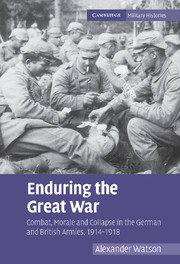Book contents
- Frontmatter
- Contents
- List of plates
- List of figures
- List of tables
- Acknowledgements
- List of abbreviations
- Map: The Western Front 1914–1918
- Introduction
- 1 War of endurance
- 2 Why men fought: combat motivation in the trenches
- 3 Self-deception and survival: mental coping strategies
- 4 Junior leadership: command, cohesion and combat motivation
- 5 Morale and military endurance
- 6 The German collapse in 1918: strike, mutiny or an ordered surrender?
- Conclusion
- Appendix 1 Walter Ludwig's study of Württemberg soldiers' coping strategies
- Appendix 2 Psychiatric casualties in the German and British armies
- Appendix 3 Military ranks and status in the German and British armies
- Glossary of German terms
- Bibliography
- Index
3 - Self-deception and survival: mental coping strategies
Published online by Cambridge University Press: 05 February 2014
- Frontmatter
- Contents
- List of plates
- List of figures
- List of tables
- Acknowledgements
- List of abbreviations
- Map: The Western Front 1914–1918
- Introduction
- 1 War of endurance
- 2 Why men fought: combat motivation in the trenches
- 3 Self-deception and survival: mental coping strategies
- 4 Junior leadership: command, cohesion and combat motivation
- 5 Morale and military endurance
- 6 The German collapse in 1918: strike, mutiny or an ordered surrender?
- Conclusion
- Appendix 1 Walter Ludwig's study of Württemberg soldiers' coping strategies
- Appendix 2 Psychiatric casualties in the German and British armies
- Appendix 3 Military ranks and status in the German and British armies
- Glossary of German terms
- Bibliography
- Index
Summary
Adaptation
Human resilience lay at the heart of the robustness displayed by the German and British armies on the Western Front between 1914 and 1918. Military institutions certainly enforced unit cohesion at the front, while societal and battlefield influences may have encouraged men to accept that fighting was necessary. Yet without individuals' innate ability to cope psychologically with the discomfort, danger and, above all, disempowerment of combat, armies would soon have become ineffective organisations full of mentally broken men. The low rates of psychiatric disorders and common displays of astounding endurance witnessed at the front testify, however, to men's success at overcoming unprecedentedly stressful conditions. As the psychiatrist Frederick Dillon observed, ‘it was an impressive fact in the great war [sic] to note the extent to which the ordinary man was capable of adapting himself to active war conditions’.
At the heart of men's adaptation lay the development of appropriate risk-assessment strategies. Soldiers who underestimated or were unable to recognise mortal threat could be overconfident and lose their lives through carelessness. Overestimation of danger could, however, be no less problematic, engendering unnecessary fear and anxiety which might result in panic or mental collapse. Troops new to the front were especially inclined to assess risk inappropriately. On both sides, wartime recruit training was short and often of poor quality. Men consequently arrived in the line with an ignorance of the power of modern weaponry which today seems astounding.
- Type
- Chapter
- Information
- Enduring the Great WarCombat, Morale and Collapse in the German and British Armies, 1914–1918, pp. 85 - 107Publisher: Cambridge University PressPrint publication year: 2008



